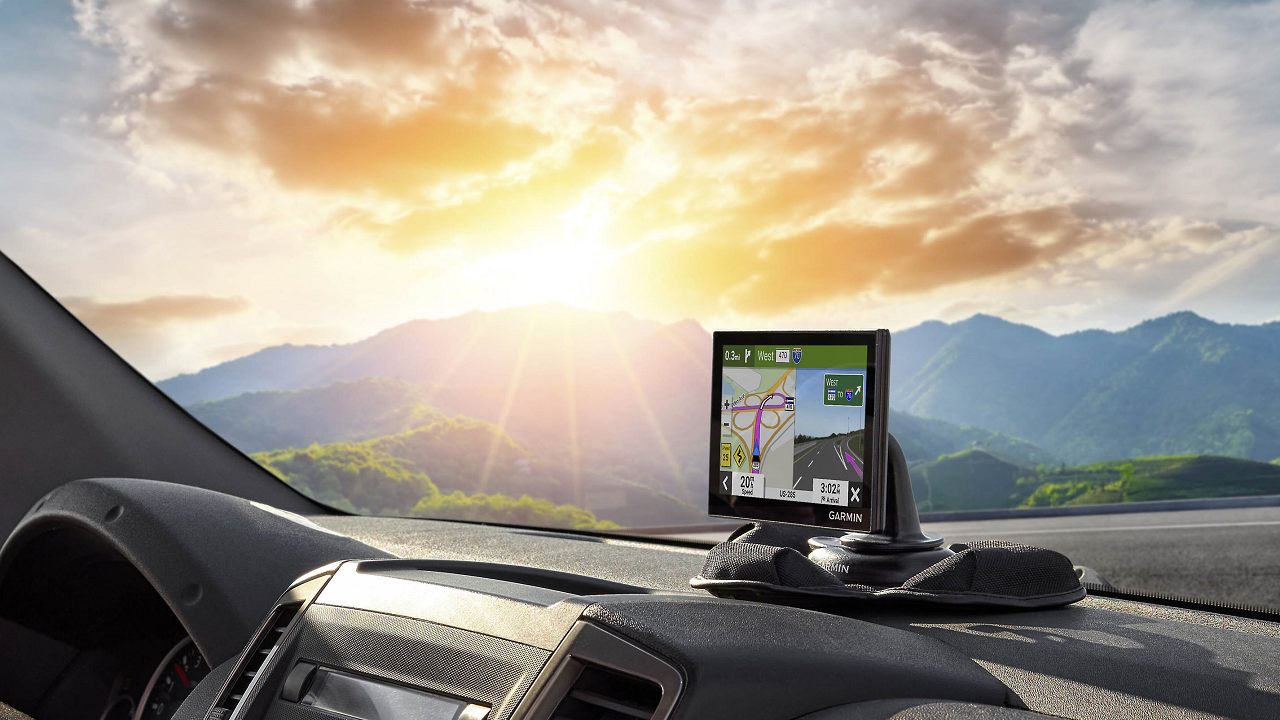

Car GPS trackers have come a long way from simply pinpointing your vehicle’s location. Today, these devices deliver a suite of connectivity options—like real-time updates, customized driving reports, and instant alerts right to your phone. Whether you’re a parent keeping tabs on a new driver, a small-business owner overseeing a fleet, or someone who just wants an extra layer of security, the added peace of mind is hard to ignore.
Despite possibly shady and downright unlawful applications (tracking a person without their consent is illegal in most states), GPS trackers have plenty of legal and reasonable uses. A GPS tracker can provide everything from instant theft-recovery data to cost-saving insights for commercial operations. We put some of the leading trackers through their paces to see which ones excel in reliability, user-friendliness, and value—so you can choose the best fit for your garage.
More Gear Tests: Best Dash Cams | Best Tire Inflators | Best OBD-II Scanners

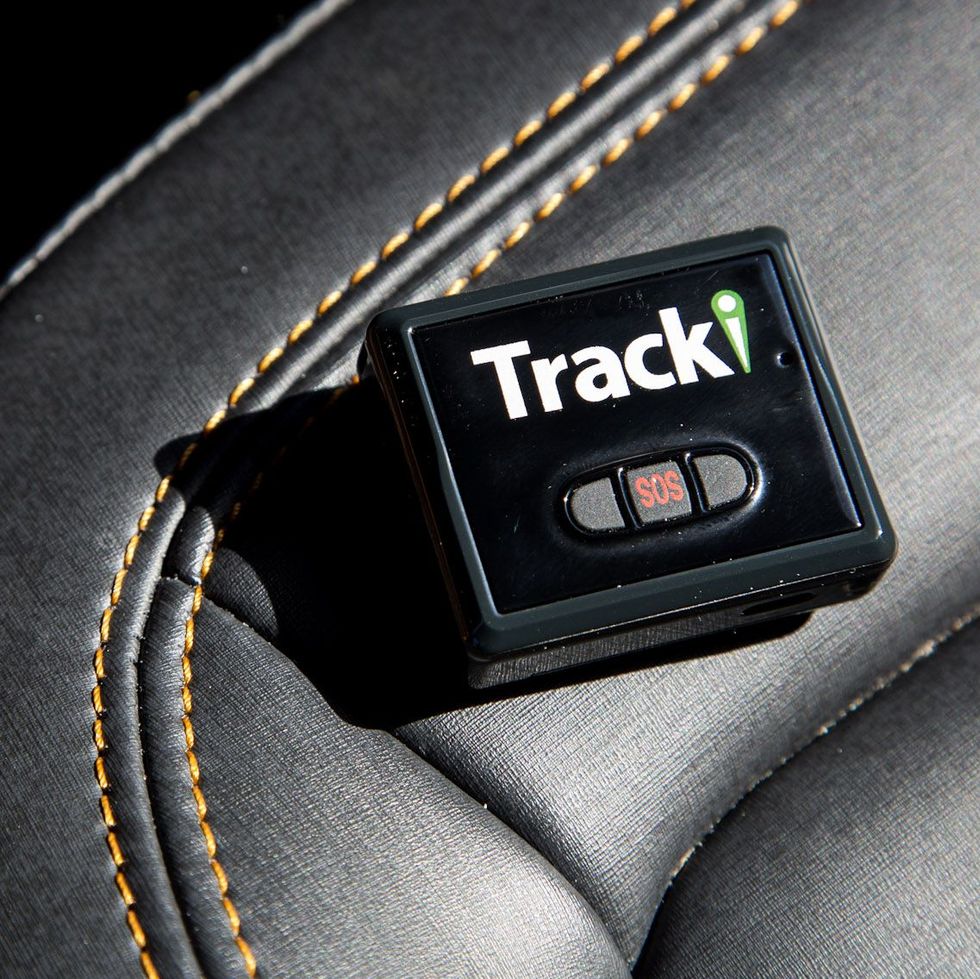


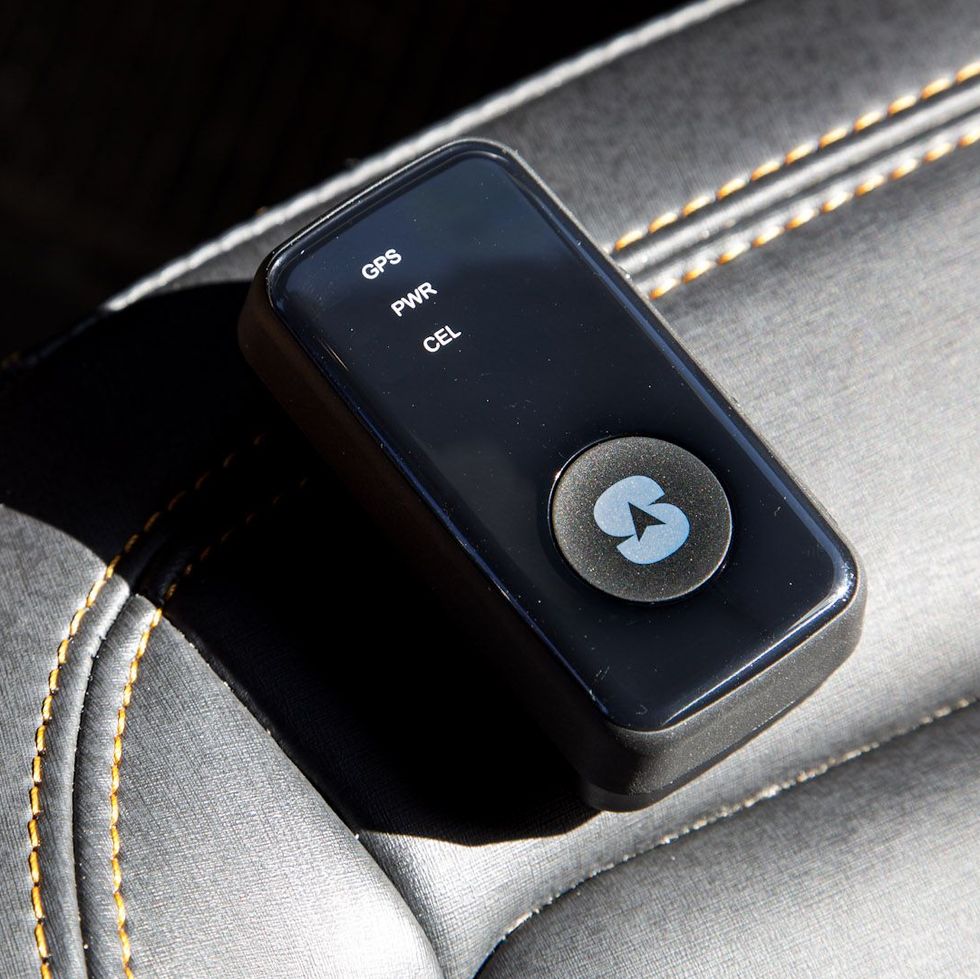
Some trackers plug directly into your vehicle’s OBD-II port, while others are battery-powered and can be hidden in various spots. OBD-II units are easier to install and draw power from your vehicle, but they’re also more conspicuous. Battery-powered models give you stealthier placement, though you’ll need to stay on top of recharging or replacing batteries.
Most GPS trackers rely on cellular networks and charge a monthly or annual subscription for data. Be sure to compare plans and coverage options, particularly if you live or drive in areas with spotty cell service.
A well-designed companion app can make or break your user experience. Look for easy-to-read dashboards, real-time tracking accuracy, and quick access to history logs. Push notifications for speeding, boundary crossing, or excessive idling can also be a game changer.
Tracking an individual’s car without their consent is illegal in most areas, so make sure you’re staying within legal and ethical boundaries. Parents and fleet managers typically have a clear right to track vehicles they own, but always check your local regulations.
Consider not just the initial cost of the device in context with its features but also its long-term expenses when subscriptions are required. If you just need a straightforward device to locate a stolen car, a basic model may suffice. If you want detailed driving analytics or advanced geofencing, prepare to invest a bit more, both upfront and over the long haul.
RELATED: The Best OBD-II Scanners, Tested
When we ran these trackers through our Gear Team testing gauntlet, we noted the following parameters:
We tested each tracker on a test route featuring a gamut of possible GPS-tracker triggers, including an underground structure. (Interestingly, none of the trackers we tested dropped their signal, even five stories down.)
Next, we dug through each product’s app and desktop versions, noting the alerts, reports, and notifications. To gauge the user experience, a tester familiar with the apps compared user-experience notes with another tester who had zero experience using them, evaluating each app’s user interface and learning curve to usability.
We settled on a 2022 Ford Bronco Badlands (with a manual!) for this test. On our planned testing route, we had to navigate five stories in an underground parking garage, which proved a bit tricky thanks to the size of the Badlands but gave us the testing data we needed. That’s right: We tested small, discreet devices in a vehicle that is anything but. Fitting, right?
Which GPS trackers performed best for various types of users? Here’s what we found.

Credit: Gannon Burgett
Bouncie’s effortless user experience makes it our choice for the Best Overall. Activating the device took mere moments since it has a true plug-and-play setup. After a quick 10-minute drive, we were good to go.
With a range of alert options like impact detection, curfew, and erratic driving, it was clear Bouncie has given sincere thought to what a typical person is looking for in a GPS tracker. The real star was its intuitive, easy-to-use app, which displays fuel levels, engine and battery health, and vehicle specs. It even features a space for insurance details.
One benefit to an OBD-connected GPS tracker is you don’t have to worry about its battery dying. However, that convenience comes at a cost, since the Bouncie will only report while the car ignition is on.
Alerts:
Key Features:
| Powered By | OBD-II port |
|---|---|
| Notification Methods | Push |
| Operating Systems | iOS, Android, Desktop |
| Can you run reports? | No, trip and alert overviews only |
| Monthly Subscription Cost | $8.00 |
| Annual Subscription Cost | N/A |

Credit: Gannon Burgett
With belt clip, key chain, and magnetic accessories, the Tracki is as versatile as it is reliable. During the test we were delighted with the steady influx of alerts we received via email and text; the push notifications were less predictable.
This device has powerful reporting options, and you can easily customize the data that is important to you through the app or desktop. But what stands out about the Tracki are three physical buttons that send a manual alert to designated contacts, acting as a means of communication in an emergency or as simply a primitive text message.
We were impressed at the Tracki’s power, which provides an elegant solution for different needs: car, kids, pets, keys, and more.
Alerts:
Key Features:
| Powered by | Rechargeable battery |
|---|---|
| Notification Methods | SMS, Email, Push |
| Operating System | iOS, Android, Desktop |
| Can you run reports? | Yes |
| Monthly Subscription Cost | $19.95 |
| Annual Subscription Cost | N/A |
| Claimed Battery Life | Up to 5 days (1–5-minute updates) 30–75 days (low-power mode) |

Credit: Gannon Burgett
For those looking for a straightforward tracker, the LandAirSea 54 is our pick. Keeping it simple, LandAirSea only offers the three standard alerts: speed, battery, and geofencing. In spite of its simplicity, there are plenty of reports that can give you clarity on the whereabouts of your item within any specified time.
The app is rather plain but no sweat to navigate. We especially enjoyed the historical playback feature, which allows you to view your trips in intervals. While we found the email alerts to be dependable, the push notifications were fickle at best.
Alerts:
Key Features:
| Powered By | Rechargeable battery |
|---|---|
| Notification Methods | Email, Push |
| Operating Systems | iOS, Android, Desktop |
| Can you run reports? | Yes |
| Monthly Subscription Cost | $19.95 (3-minute updates) |
| Annual Subscription Cost | $179.55 (3-minute updates) |
| Claimed Battery Life | 1 week (3-second updates) 2 weeks (3-minute updates) Up to 6 months (low-power mode) |


The Apple AirTag isn’t technically an automotive GPS tracker, but through Apple’s Find My network, it’s easy to keep tabs on your car.
There’s no option for geofences or departure notifications, but through Apple’s iCloud web interface, it’s possible to track your vehicle as long as it’s in proximity to someone using an iPhone or iPad running iOS 14.5 or later. Drivers who aren’t in the owner’s network may also be alerted to the AirTag’s presence, undermining its stealthiness.
No subscription is required, making this one of the more affordable options out there—even if that comes at the expense of more precise tracking features and alerts. As a bonus, the battery life is fantastic, with an AirTag able to work up to a year on a user-replaceable CR2032 coin cell battery.
It’s also available in four-packs ($82.99 at Amazon).
Alerts:
Key Features:
| Powered by | CR2032 coin cell battery |
|---|---|
| Notification Methods | Push, Email, App |
| Operating System | iOS, macOS, any OS with a browser |
| Can you run reports? | No |
| Monthly Subscription Cost | N/A |

Credit: Gannon Burgett
The battery-powered Spytec GL300 is one of the more capable tracking units we tested. While it’s designed for fleet-level tracking, it’s also intuitive enough to use for personal needs.
Both the web interface and mobile apps (Android, iOS) are simple to navigate. While setting up alerts requires a learning curve, the push notifications were fast and reliable, updating within seconds of entering and exiting the geofences we set up.
The Spytec is IPX5 compliant, meaning it can handle the elements should it be mounted outside the vehicle. The integrated 2600mAh Li-Po battery can power the device for seven to 10 days, based on two hours of movement per day; in Standby mode, it can go up to 25 days on a single charge.
Alerts:
Key Features:
| Powered By | Internal rechargeable battery |
|---|---|
| Notification Methods | Text, Email, Push |
| Operating Systems | Android, iOS, macOS, Windows |
| Monthly Subscription Cost | $30.00 |
| Annual Subscription Cost | $300.00 |
| Claimed Battery Life | Up to 14 days (low-power mode) |
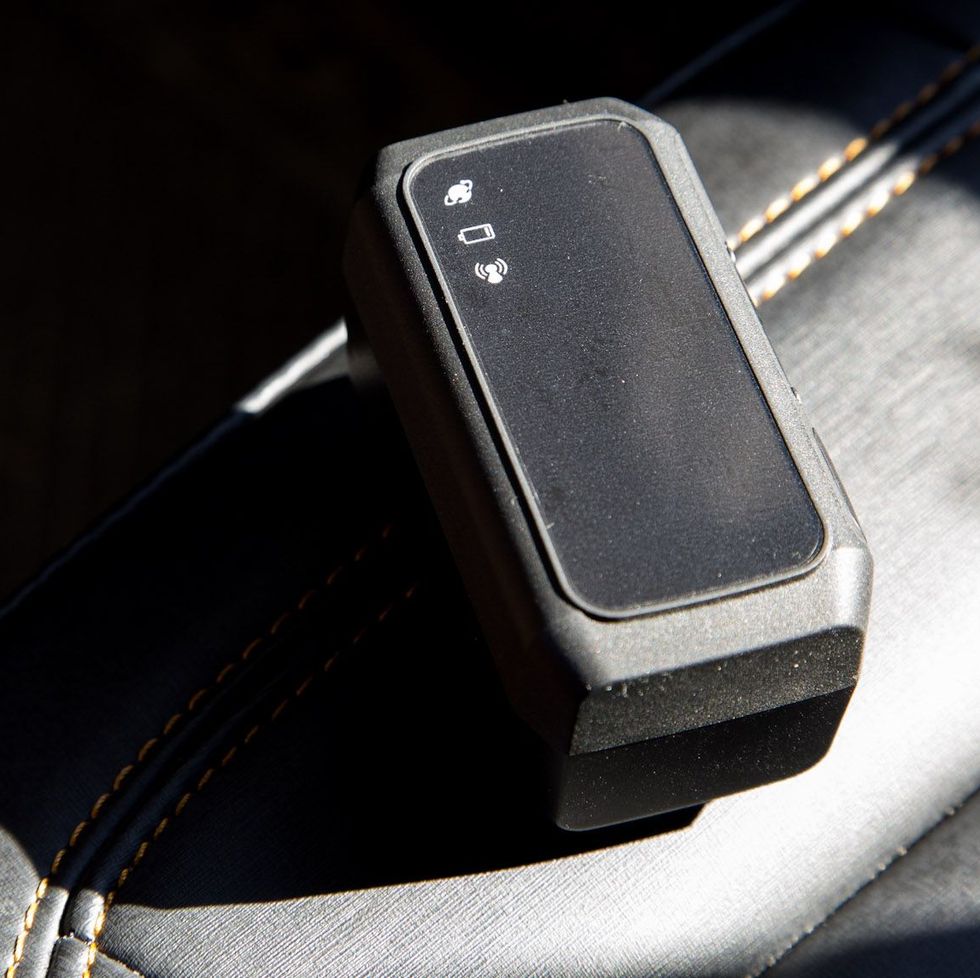
Credit: Gannon Burgett
This device isn’t for keeping tabs on your teenager’s car or a grandparent’s whereabouts. The Optimus 3.0 is an industrial-grade GPS tracker with features ideal for tracking fleet vehicles.
The device itself is fairly straightforward to turn on and set up, but both the online and mobile interface proved convoluted. The back end is clearly designed for detailed fleet management, and the reporting is far more detailed and thorough than the typical driver would need.
Notifications were reliable, and the sheer number of alert types you can define is impressive, but it seems excessive for all but the most commercial of uses.
Alerts:
Key Features:
| Powered By | Internal battery |
|---|---|
| Notification Methods | Text, Email, App, Web app |
| Operating Systems | Android, iOS, macOS, Windows |
| Monthly Subscription Cost | $19.95 |
| Annual Subscription Cost | N/A |
| Claimed Battery Life | Between 2 and 5 weeks (low-power mode) |

Credit: Gannon Burgett
The Kayo GPS Tracker didn’t excel in any one area and lacks the detailed reporting and notification alerts of other trackers, but it did prove reliable in real-time tracking. At just $5 per month, it is also the cheapest subscription of the bunch, with no separate activation fees or annual contracts.
The Kayo uses an integrated SIM card that works within the United States, and the company offers a 14-day free trial. In addition to reliable real-time tracking, you can also set up manual maintenance reminders within the app so you won’t forget the last time you rotated your tires, changed your oil, or swapped out your air filter.
We would’ve liked to see a geofence function and more robust alerts, but this bare-bones approach does keep cost and complications down. The Kayo mobile app (Android, iOS) is available to download for free.
Alerts:
Key Features:
| Powered By | OBD-II port |
|---|---|
| Notification Methods | Push |
| Operating Systems | Android, iOS, macOS, Windows |
| Monthly Subscription Cost | $5.00 |
| Annual Subscription Cost | N/A |
 Photo Credit: Gannon Burgett|Car and Driver
Photo Credit: Gannon Burgett|Car and DriverDuring this test, our office resembled a hacker hideout from a heist film. With each interface pulled up across several screens and every app running, we set out to determine the following parameters:
To test alert reliability, we set each tracker with a geofence around our office in Ann Arbor. Next, we set each to notify the team whenever we exceeded 65 mph. Additional alerts that we set—but varied from tracker to tracker—included hard braking, rapid acceleration, harsh cornering, and fuel levels. Finally, we installed the trackers into a Ford Bronco, where tester Collin Morgan ran through the gamut of tall city buildings, underground-parking ramps, highway driving, and tunnel runs.
During his route, Morgan triggered as many alerts as possible and called us whenever he did. While he drove the Bronco, we furiously recorded alerts and monitored each device for signal drops back at the office. Dozens of emails and text messages later, we were impressed to find we never witnessed a drop of signal on any of these trackers, even when the Bronco went five stories underground.
To evaluate all the data and features each tracker offered, we scoured the apps and desktop versions of each, taking notes on what types of alerts could be triggered, what reports could be run, and methods of notification (SMS, email, or app).
We ran a tiered approach to our ease-of-use evaluation. First, Katherine Keeler spent several days familiarizing herself with the interfaces. The second round came on testing day, when Gannon Burgett assessed the apps as a complete newbie. After that, we compared notes on each user interface and its learning curve.
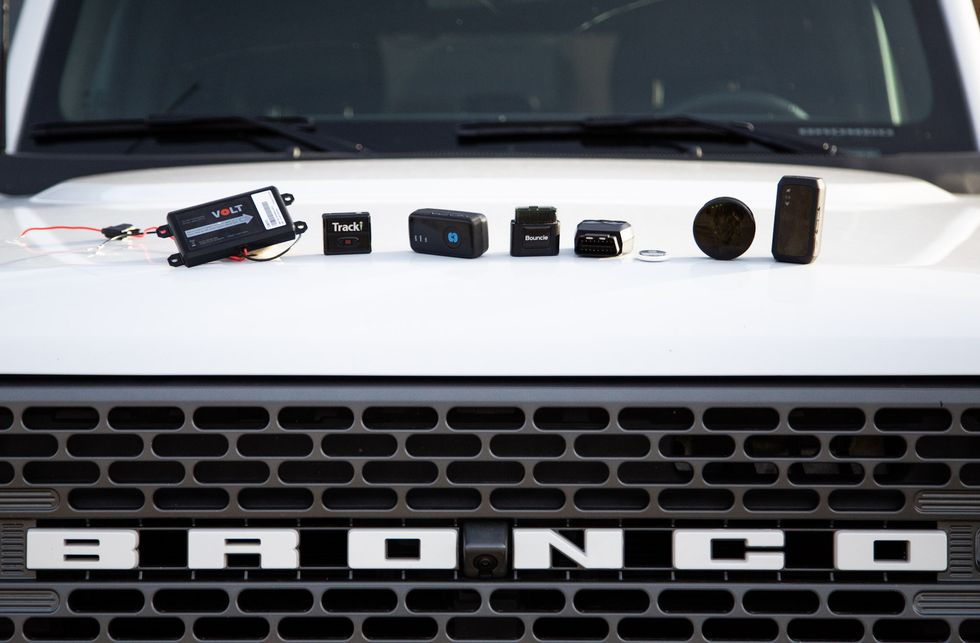 Photo Credit: Gannon Burgett|Car and Driver
Photo Credit: Gannon Burgett|Car and DriverSome trackers offer limited functionality without a data plan, but most require an active subscription to provide up-to-the-minute location data and alerts.
As long as you own or lease the vehicle–and any drivers are aware they’re being monitored–you’re typically in the clear. Always confirm your state or country’s laws to be safe.
Most trackers connect to a mobile app or web platform that can send push alerts, text messages, or emails for everything from excessive speed to geofence breaches.
Modern devices can typically pinpoint location within a few yards, but accuracy depends on cellular coverage and GPS signal strength. Rural areas with spotty network reception may pose occasional challenges.
Hardwired devices that pull power from your car can put a minor strain on the battery, especially if your vehicle sits idle for extended periods. Battery-powered units avoid this issue but require regular recharging.
Some manufacturers offer tamper alerts if the tracker is unplugged or moved. However, once physically removed or destroyed, real-time location updates will cease immediately.
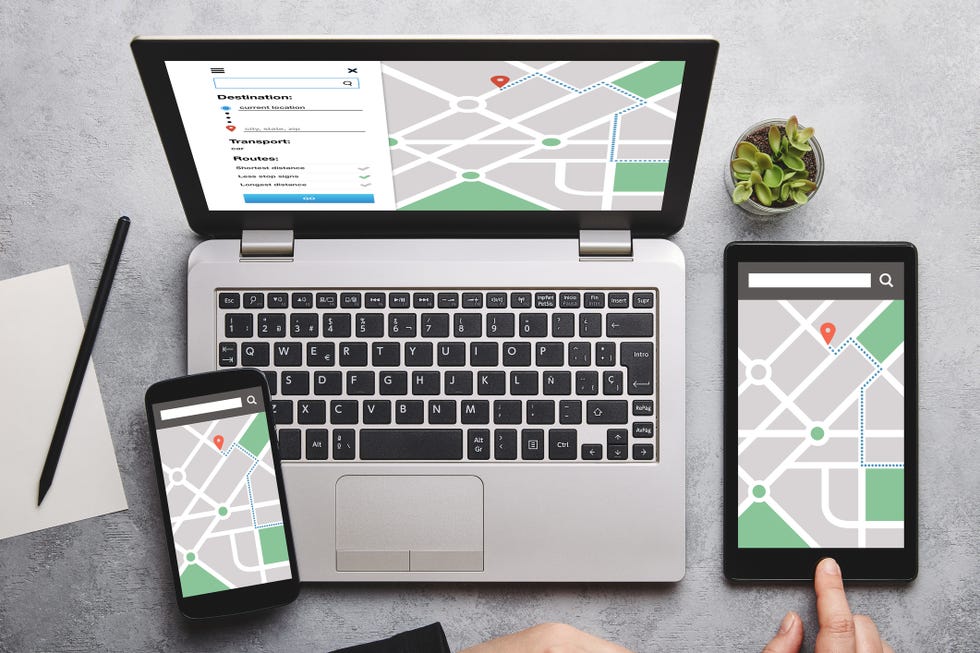 CarmenMurillo
CarmenMurilloHearst Autos combines the talent, resources, and expertise of three of the largest, most influential automotive publications in the world. The Gear Team has tested a wide variety of automotive products, parts, accessories, and gear, such as dash cams, portable jump starters, electric scooters, and snow brooms and ice scrapers. We get our hands on each and every product we test. Most are purchased; some are supplied by manufacturers.
Hearst Autos doesn’t need to game algorithms for traffic or promote lousy products. We’re more concerned with our legacy, our reputation, and the trust that our readers have in Car and Driver, Autoweek, and Road & Track to deliver honest opinions and expert evaluations.
Visit our Tested & Trusted page to see the very best in automotive gear. Read more about our product testing and evaluation process here.
100% Original product that covered warranty by the vendor.
You have the right to return your orders within 30 days.
Your orders are shipped seamlessly between countries
Your payments are secure with our private security network.

(888) 4000-2424
